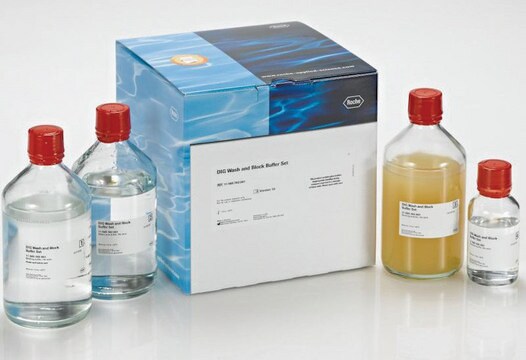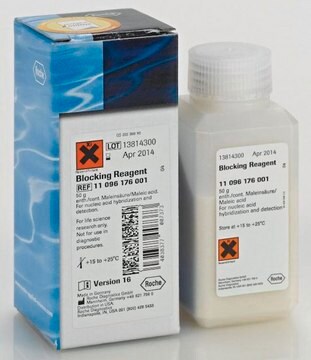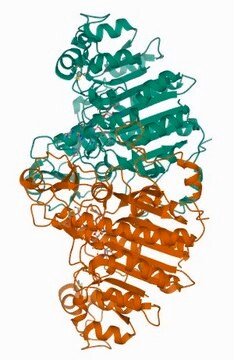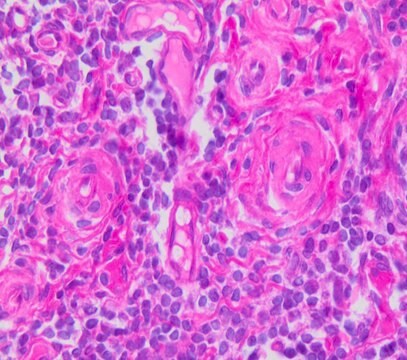PF092
Fas Ligand Plus, Human, Recombinant
Fas Ligand Plus, Human, Recombinant, consists of amino acids 103-281 fused to a 26-amino acid linker and FLAG®-tag at the N-terminus and expressed in HEK293 cells.
Zaloguj sięWyświetlanie cen organizacyjnych i kontraktowych
About This Item
Kod UNSPSC:
12352202
Polecane produkty
rekombinowane
expressed in HEK 293 cells
Poziom jakości
Próba
≥95% (SDS-PAGE)
Postać
lyophilized
producent / nazwa handlowa
Calbiochem®
warunki przechowywania
OK to freeze
avoid repeated freeze/thaw cycles
Warunki transportu
wet ice
temp. przechowywania
−20°C
Opis ogólny
Recombinant, human Fas ligand (amino acids 103-281) fused to a 26-amino acid linker and FLAG®-tag at the N-terminus and expressed in HEK293 cells. Does not require enhancer for activity. Suitable for cytotoxicity assays. M.W. 32,000 - 35,000.
Recombinant, human Fas ligand (amino acids 103-281) fused to a 26-amino acid linker and FLAG®-tag at the N-terminus and expressed in HEK293 cells. Glycosylation of recombinant human sFasL is similar or identical to natural human FasL. The molecular weight is ~32 kDa (nonglycosylated) and ~37-42 kDa (glycosylated) by SDS-PAGE under reducing conditions. The recombinant protein is produced in HEK293 cells. It does not require enhancer for activity. Useful for cytotoxicity assays.
Fas Ligand (FasL/APO-1L/CD95L) is a ~37-42 kDa type II transmembrane protein belonging to the TNF family. Interaction between FasL and Fas induces apoptosis of Fas-sensitive cells. FasL is implicated in CTL-mediated-killing, activation-induced cell death, creation of immune-privileged sites and tissue homeostasis. The extracellular domain of human FasL can be cleaved off by a metalloprotease, generating soluble FasL (sFasL). Circulating sFasL can be detected in serum of patients with melanoma and certain types of lymphoma.
Fas Ligand (FasL/APO-1L/CD95L) is a ~37-42 kDa type II transmembrane protein belonging to the TNF family. Interaction between FasL and Fas induces apoptosis of Fas-sensitive cells. FasL is implicated in CTL-mediated-killing, activation-induced cell death, creation of immune-privileged sites and tissue homeostasis. The extracellular domain of human FasL can be cleaved off by a metalloprotease, generating soluble FasL (sFasL). Circulating sFasL can be detected in serum of patients with melanoma and certain types of lymphoma.
Działania biochem./fizjol.
≥1 ng/ml kills Fas-sensitive cells
Ostrzeżenie
Toxicity: Standard Handling (A)
Postać fizyczna
Lyophilized from PBS.
Rekonstytucja
Following reconstitution, aliquot and freeze (-20°C). Stock solutions are stable for up to 3 months at -20°C.
Reconstitute in 50 µl PBS to yield a final stock concentration of 100 µg/ml. Further dilute in culture medium with 5% FCS immediately prior to use.
Inne uwagi
Ashkenazi, A., and Dixit, V.M. 1998. Science281, 1305.
Nagata, S., 1997 Cell88, 355.
Hahne, M., et al. 1996. Science274, 1363.
Bellgrau, D., et al. 1995. Nature377, 630.
Lowin, B., et al. 1994. Nature370, 650.
Russell, J.H., et al. 1993. Proc. Natl. Acad. Sci. USA90, 4409.
Nagata, S., 1997 Cell88, 355.
Hahne, M., et al. 1996. Science274, 1363.
Bellgrau, D., et al. 1995. Nature377, 630.
Lowin, B., et al. 1994. Nature370, 650.
Russell, J.H., et al. 1993. Proc. Natl. Acad. Sci. USA90, 4409.
Glycosylation of recombinant human sFasL is similar or identical to natural human FasL. The molecular weight is ~32 kDa (nonglycosylated) and ~35 kDa (glycosylated) by SDS-PAGE under reducing conditions. The recombinant protein is produced in HEK293 cells. It does not require enhancer for activity.
Informacje prawne
CALBIOCHEM is a registered trademark of Merck KGaA, Darmstadt, Germany
FLAG is a registered trademark of Merck KGaA, Darmstadt, Germany
This page may contain text that has been machine translated.
Kod klasy składowania
11 - Combustible Solids
Klasa zagrożenia wodnego (WGK)
WGK 1
Temperatura zapłonu (°F)
Not applicable
Temperatura zapłonu (°C)
Not applicable
Certyfikaty analizy (CoA)
Poszukaj Certyfikaty analizy (CoA), wpisując numer partii/serii produktów. Numery serii i partii można znaleźć na etykiecie produktu po słowach „seria” lub „partia”.
Masz już ten produkt?
Dokumenty związane z niedawno zakupionymi produktami zostały zamieszczone w Bibliotece dokumentów.
Nasz zespół naukowców ma doświadczenie we wszystkich obszarach badań, w tym w naukach przyrodniczych, materiałoznawstwie, syntezie chemicznej, chromatografii, analityce i wielu innych dziedzinach.
Skontaktuj się z zespołem ds. pomocy technicznej








